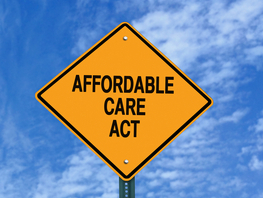 The expression of a house divided goes back to the beginning of the Common Era and further, if a linguist was to trace it. Sam Houston spoke it most famously in 1850 when he claimed “A nation divided against itself cannot stand” during a debate on the Compromise of 1850.
The expression of a house divided goes back to the beginning of the Common Era and further, if a linguist was to trace it. Sam Houston spoke it most famously in 1850 when he claimed “A nation divided against itself cannot stand” during a debate on the Compromise of 1850.
Eight months into full Affordable Care Act coverage, it appears that we are once again a nation divided – this time, into the states that chose to expand Medicaid and the states that did not (including the four that have not decided either way). When factoring healthcare receivables, it is important to be familiar with each state’s policy and what the implications may be for your business.
Medicaid Expansion
Expansion of Medicaid ties in to the tax credits available to consumers purchasing insurance on the healthcare exchanges. As of January 1, 2014, Medicaid expanded its eligibility from specific low-income groups to all individuals and households with incomes up to 133 percent of the federal poverty level – that is, in states that have pursued expansion. Meanwhile, consumers bringing home between 100 and 400 percent of the federal poverty level can qualify for tax credits to offset the cost of premiums on the exchanges.
According to the ACA, the federal government will cover 100 percent of the cost of new enrollments for the first three years of implementation. After that, federal reimbursements will gradually scale back to 90 percent of costs by 2020. This reimbursement structure will result in millions of additional dollars for expansion states in the next six years.
The ACA’s Medicaid provisions made expansion compulsory for the 50 states and the District of Columbia until the Supreme Court ruled it optional in June 2012. Because of this, a division is developing between the “haves”, or the states that expanded, and the “have-nots” that refused expansion.
The Haves
Twenty-six states and the District of Columbia took advantage of Medicaid expansion, allowing approximately 10.5 million low-income Americans to access healthcare. While the fault lines are largely ideological, there are some surprises in the Haves including Arizona and Ohio.
For the Haves, the economics of Medicaid expansion are already working. Hospitals across the nation are reporting reductions in the number of uninsured patients during the first half of the year – as high as 48 percent in states that expanded Medicaid. Fewer uninsured patients mean lower operating costs allocated to covering self-pay patients and bad debt from nonpayment, which in turn means more money to funnel into other critical areas.
The Have-Nots
The picture is significantly different for the 24 states that have either turned down Medicaid expansion or have not yet made a decision. Unfortunately, these states are home to nearly 11.9 million low-income Americans that will likely fall into an income gap that will prevent them from enrolling in an affordable health care option.
When it comes to the uninsured rate, the failure of these states to expand Medicaid has slowed the decrease of their uninsured populations to just under one percent, versus a 2.5 percent decrease in states that both expanded Medicaid and participated in a healthcare exchange. Mississippi actually saw an increase in their uninsured population.
From a financial standpoint, the Have-Nots are sacrificing millions of dollars in federal funding for new Medicaid enrollments between now and 2020. However, there is also a significant loss of current dollars due to a reduction in the Medicaid and Medicare Disproportionate Share Hospital programs. The ACA decreased the payments to these programs based on the assumption that Medicaid expansion would significantly lower the number of uninsured patients across the board, which will place a higher burden on the Have-Not states to cover the difference.

The Fallout For Medical Factoring
The news is unquestionably good for the healthcare industry in the Have states. Faster payments, guaranteed federal reimbursements and more opportunities for vendors are just a few reasons to stick with healthcare deals in these states.
Deals in the Have-Not states, on the other hand, will pose an increasing risk to factoring companies. Slower payments and decreased reimbursements are very likely, causing problems for every participant in the healthcare industry.
Be very aware of the realities of working in a non-expansion state. The health of your factoring business could depend on it.
 Philip Cohen is the founder and president of PRN Funding, LLC, which is an extraordinarily focused niche factor in the healthcare funding market place.
Philip Cohen is the founder and president of PRN Funding, LLC, which is an extraordinarily focused niche factor in the healthcare funding market place.
Visit the PRN Funding website at www.prnfunding.com for more factoring and brokering information.
Speak Your Mind